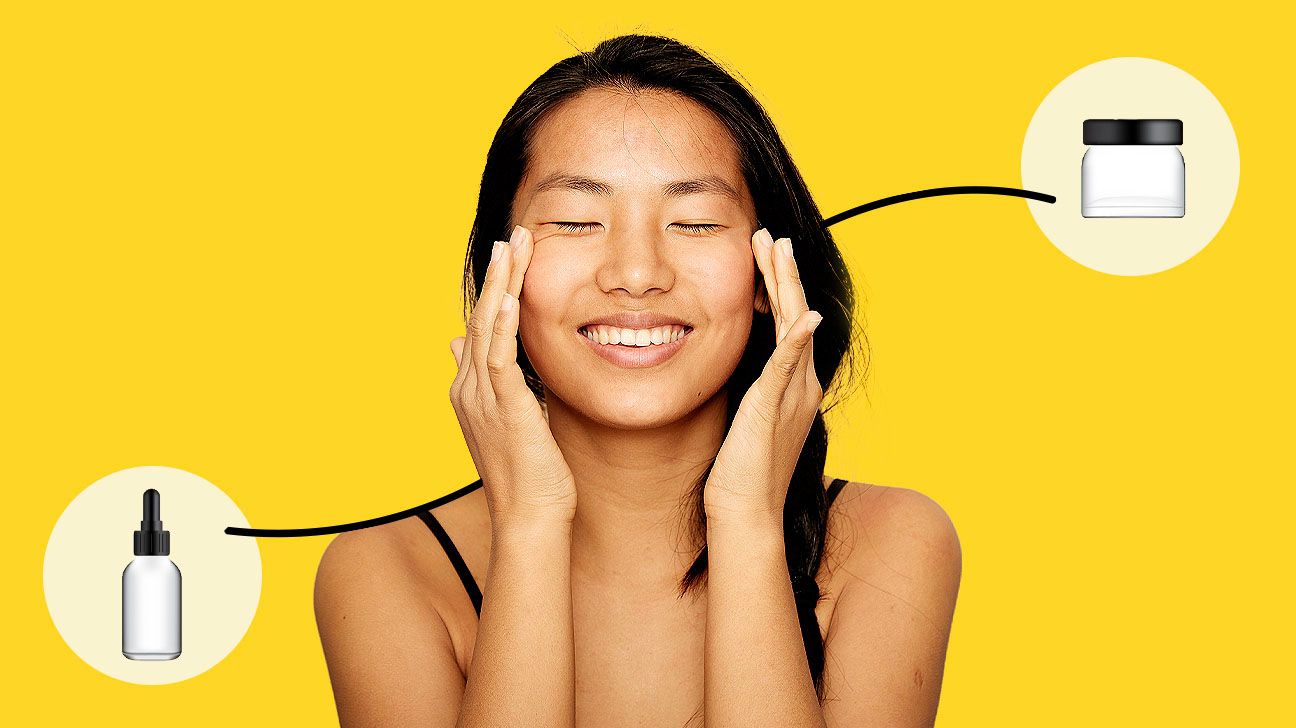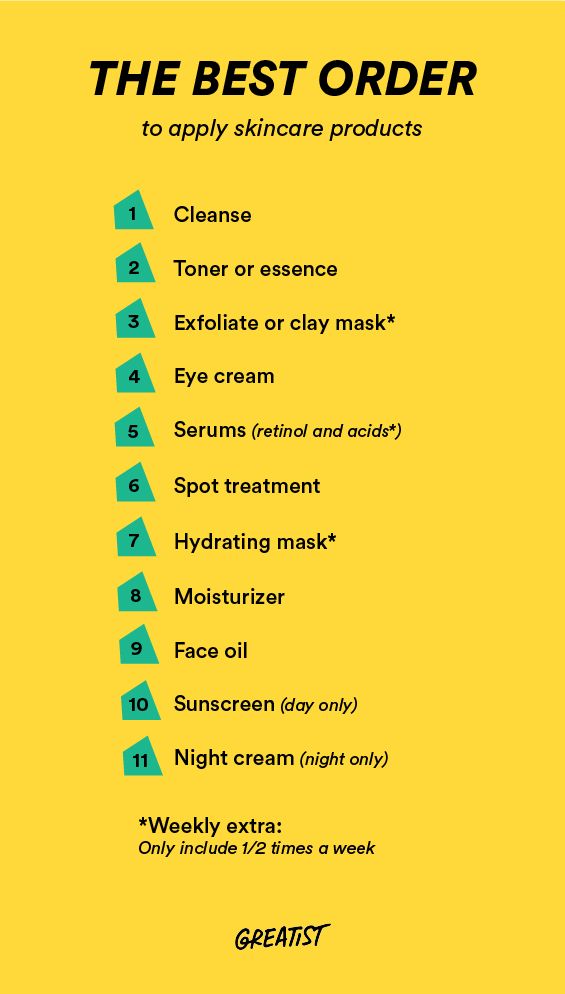You’ve read the beauty blogs and splurged on their top picks — cleanser, toner, serum, moisturizer, eye creams — and if you’re using these daily, then your skin care is sorted… right?
We hate to be the bearers of bad news, but unless you know you’re applying it in a certain order, it’s time to think again.

We know if we spent a (small) fortune on skin care, we’d want the products to work their hardest. It turns out, to do that, we have to apply them in a specific order — and not rush the process.
So, to share our knowledge, we’ve outlined a comprehensive series of steps and products for all skin types. You don’t have to have everything on this list, but you’re gonna want to follow this order.
Let’s keep it simple, unless you have two products per category, your skin care routine is going to be roughly the same in the morning as it is at night.
1. Cleanser
To allow products to really work their magic, you need to ensure your skin is a fresh slate — which is where cleansing comes in.
Everyone should cleanse in the morning but especially at night. When you’re out and about, your face gets covered not only with makeup (if you wear it) but general grime.
While you’re exposed to fewer elements overnight, your skin still sweats and collects bacteria while you’re sleeping.
How do you do it
- Wash your hands.
- Gently massage cleanser into your skin for ~1 minute.
- Wash off with warm water.
- Pat dry with a clean towel.
Pro tip: At night, try double cleansing. Start with either a noncomedogenic oil (jojoba oil works well), or an oil based cleanser to remove makeup. Follow with a water based cleanser.
Water based vs. oil based cleanser
Oil based is best for getting rid of makeup and sunscreen residue, while water based varieties are your friend for banishing dirt and sweat.
“Cleansers depend on your skin type, and it’s about choosing the one that’s right for you,” explains Ophelia Veraitch, consultant dermatologist at the Cranley Clinic. “If you have acne, for example, you don’t want to use any kind of soap based or foaming cleanser, as that increases oil production.”
Recommended products
- DHC Deep Cleansing Oil (oil based)
- SkinCeuticals Soothing Cleanser (water based)
These products, as well as all the products in this article, come recommended by dermatologist Dr. Ophelia Veraitch.
2. Toners and essences
Toner formulas vary, depending on the product they may clear away dead skin cells, unclog pores, and/or aid in brightening and restoring your skin’s pH balance.
“You use toner to get rid of all the cleanser and make your skin feel refreshed as you prepare to put on products containing active ingredients, and moisturizers,” says Dr. Veraitch.
Essences are similar to toners but they’re more lightweight and generally used for hydrating.
In general, consider toners and essences optional. Depending on your skin type, you may or may not see results.
Pro tip: If you have oily skin, try an astringent toner. If you’re using a hyaluronic acid later in your routine, use a hydrating toner to follow up.
Recommended products
- Toner: Avene Micellar Lotion.
- Essence: Missha Time Revolution Essence, Intensive Moist
3. Eye cream
Eye cream fights fine lines and dark circles around your peepers. “You want to use thinner creams here, as the skin around the eyes is thinner,” says Dr. Veraitch.
Consider eye creams an optional step in your routine, as they’re generally quite expensive. Using a serum around your eyes may produce similar benefits, but doubl- check that the ingredients aren’t too harsh.
How to do it
As it’s being applied to such a specific area, you won’t require much. Put a small amount on your fingertip (use your ring finger to apply) and gently pat the under-eye area until it’s all absorbed.
Pro tip: If your eye cream contains retinol and you’re using it in the morning, be sure to apply sunscreen after and keep reapplying throughout the day.
Recommended products
- Alpyn Beauty – Natural PlantGenius Line-Filling Eye Balm.
4. Serums, including acids and retinol
Serums contain high concentrations of ingredients, like antioxidants and/or acids, aimed at cell repair and protection. They’re especially effective at repairing sun damaged skin and evening out skin tone.
But the type of serum you want to use also depends on what actives you used earlier in the toner/essence stage. Actives are anything that claims to change your skin, such as acids, retinol, and vitamins.
“If you’re using a product containing active ingredients, you need to wait a few minutes until you apply the next,” adds Dr. Veraitch. “Otherwise, you’re essentially diluting the active ingredient, and it won’t be as effective.”
Day serum
Your day serum should focus on hydration and protection. Day serums commonly contain acids, such as hyaluronic, salicylic, and L-ascorbic (vitamin C).
These ingredients encourage cell turnover and rejuvenation, which helps with everything from spots and wrinkles to skin tone and scarring.
Night serum
Your night serum should focus on repairing and resurfacing skin cells. You can use acid based serums at night, but if retinol is on the docket, use this instead.
“Retinol should be put on at night, because it makes your skin more sensitive to sunlight,” explains Dr. Andrew Birnie, consultant dermatologist and creator of Altruist sunscreen.
Retinol is a synthetic form of vitamin A. This powerful ingredient stimulates cell production and fights signs of aging.
If using a retinol, it’s best to pace yourself. “Retinol products are much more likely to be irritants, so you have to build up the application,” says Dr. Birnie. “Use it every couple of days, or every other day, before applying daily.”
Pro tip: Start with a 0.3 to 0.5 percent retinol, suggest Dr. Veraitch. This may be plenty strong for your skin. Then try bumping up to a 1 percent.
Recommended products
- Morning: Dr. Brenner Vitamin C Serum with Ferulic Acid, Vitamin E and Hyaluronic Acid
- Night: Paula’s Choice 1% Retinol Treatment
5. Spot treatment
Spot treatments are designed to fight acne, dark spots, and blemishes. If you’re fortunate enough to have skin clearer than Caribbean waters, then move on.
Pro tip: While some spot treatments are designed for use in the morning, many work best with nighttime application, as those hours of slumber are when your body switches up a gear to repair and rejuvenate.
How to do it
If your spot treatment contains salicylic or lactic acid, concentrate it around your T-zone, says Dr. Veraitch. Or exactly where your spots are. If it’s a gentler formulation, then it’s fine to use it all over.
Avoid using this product on the skin around your eyes, she adds.
Recommended products
- Neutrogena Rapid Clear Stubborn Acne Spot Treatment Gel
6. Moisturizer
No matter how many serums you have, “everyone benefits from using [moisturizer],” says Dr. Veraitch. It’s essential in helping to protect the skin’s natural barrier and lock in moisture.
However, your skin type will determine which formulation is best to use. If you have dry skin, ointments are a good option, whereas, if you’ve got oily skin, or are prone to getting rosacea or acne, then creams are better, she explains.
Recommended products
- Dry skin: CeraVe Daily Moisturizing Lotion
- Oily skin: La Roche Posay Effaclar Mattifying Moisturizer
7. Face oil
Your skin already makes its own oil called “sebum,” so depending on your skin type, so you might not need face oil. Dr. Veraitch doesn’t recommend them to her clients because she’s found they caused more problems than benefits in her practice.
However, everyone is different. Folks with dry or dehydrated skin may find that using a face oil product helps complement their sebum production: notably around moisture retention and protecting the natural skin barrier.
There are a variety of different oils typically used for these products, although the most popular include squalane, jojoba, marula, argan, and rosehip: all of which are bursting with beneficial antioxidants and anti-inflammatory properties.
Recommended product
- The Ordinary 100% Cold-pressed Virgin Marula Oil.
*As mentioned, Dr. Veraitch doesn’t recommend using face oil. Our editor chose this based on The Ordinary’s commitment to transparency of ingredients and affordable products.
8. Sunscreen (day) or thick cream (night)
Sunscreen is the most important step in your daytime routine. In addition to helping prevent sun burn (which could eventually develop into skin cancer), it helps protect against cumulative sun damage.
“Every time you go out, there’s a bit of sun — or UV rays — going onto your skin,” explains Dr. Birnie, “and that gradually builds up over a lifetime.”
This can lead to cancerous cells on the surface of the skin, sun spots, wrinkles, and general signs of aging.
You need to put on sunscreen daily — even if it’s cloudy.
Recommended product
- EltaMD UV Daily Facial Sunscreen SPF 40.
Night cream
Night cream is essentially a rich moisturizer. “It keeps your skin hydrated, and helps improve the appearance of fine lines,” says Dr. Veraitch.
Night cream is an optional step but consider using it as you head into your 30s.
“As you get older, using night cream is important,” says Veraitch. “Oil production declines as you age, so you’ll need that extra moisture.”
Recommended product
- Dermalogica Pure Night.
These are the fun, likely pricier goodies that shouldn’t be used on a daily basis. Sure your skin might have a natural glow and impossibly perfect radiance after, but overuse can actually damage your skin.
For these products, try not to apply more than 2 times a week.
Clay mask
Clay masks work to intensively unclog pores and banish excess shine. They can also help brighten skin.
While all skin types can benefit from using clay masks, they’re particularly beneficial for those with oily skin.
As they’re a heavier formulation, it’s best to only apply clay masks once a week — and be sure not to leave it on for more than 15 minutes, as any longer can start drying out skin.
Recommended products
- Kiehl’s Rare Earth Deep Pore Cleansing Masque
Hydrating mask
Usually found in a cream or sheet format (whimsical animal print optional), these masks contain ingredients designed to hydrate and lock in moisture — and even reinforce our skin’s cells.
Thanks to its hydrating properties, these masks can be used a bit more often than their clay counterparts — three times a week if required.
Recommended product
- Glossier Moisturizing Moon Mask
Exfoliation
Chemical and physical exfoliation removes dead skin cells and unclogs pores. This can be helpful for managing acne, blackheads, and flaky skin patches.
While there are many different ways to exfoliate, the general rule is to limit it to a couple times a week. You may even want to skip this if your daily toner and serum already has acids.
Exfoliating too often can rub away your skin’s natural protective barrier and strip away moisture, says Birnie.
Some skin types might want to avoid exfoliating altogether. “If you’ve got really sensitive skin, exfoliating could potentially irritate,” he says.
Recommended products
- Dermalogica Daily Microfoliant
When it comes to choosing products, you should tailor your skin care regime according to the concern you’re trying to address, says Dr. Veraitch. “Especially for acne, the simplest skin care regimes are often better.”
In fact, using too many rich products can lead to congested and even inflamed skin.
It’s always best to talk to a dermatologist about developing a skin care routine that makes the most sense for your skin (and your wallet).
Chantelle Pattemore is a writer and editor based in London, UK. She focuses on lifestyle, travel, food, health, and fitness.


